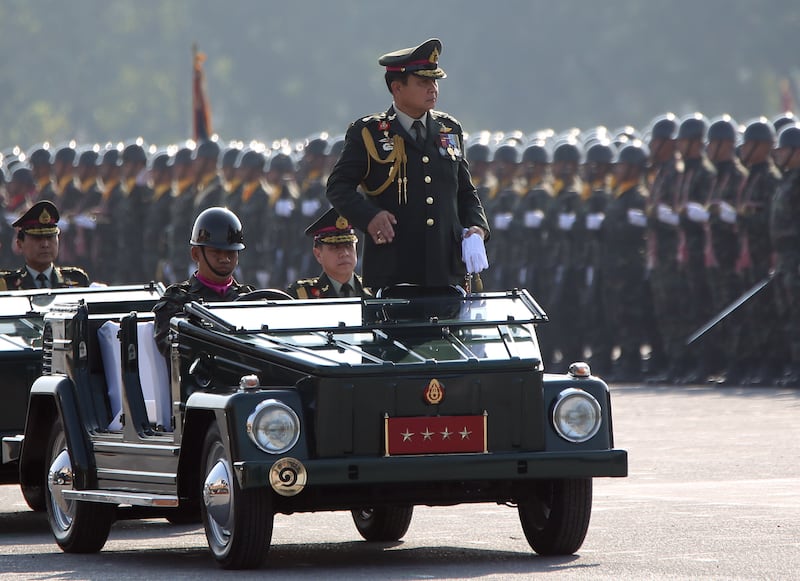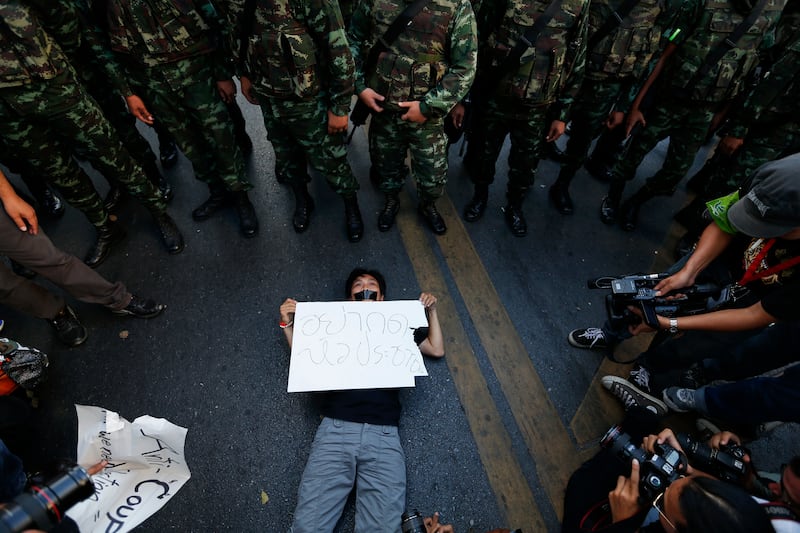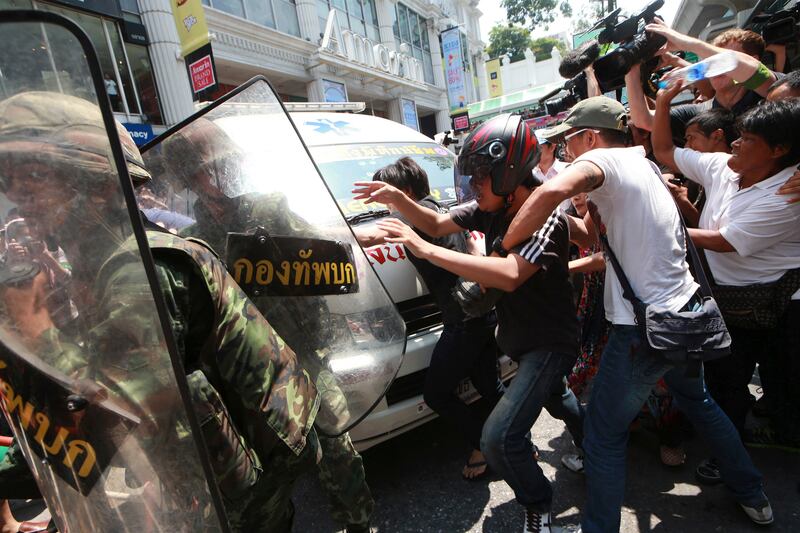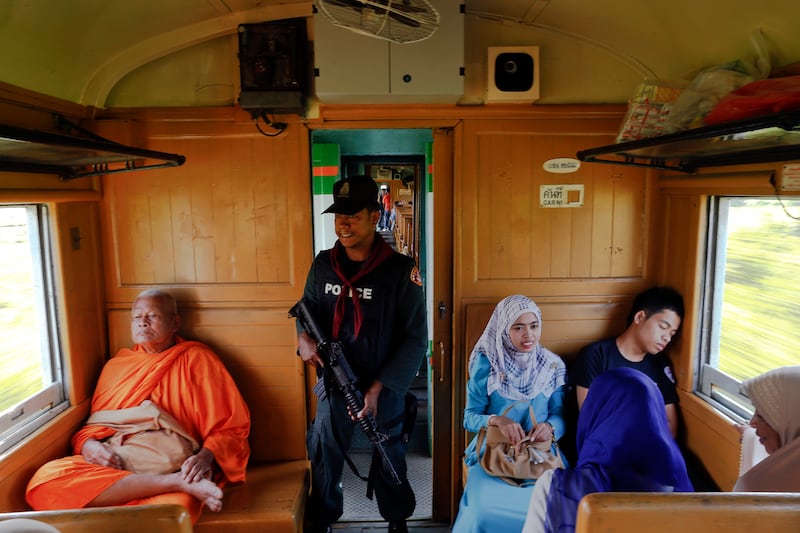Ten years on, the legacy left in Thailand by the coup of May 22, 2014 continues to shape the political landscape.
Elections may have been restored, but Thai democracy has not yet recovered, analysts say, and the country’s conservative establishment still maintains power.
The coup followed months of political turmoil in Thailand. Shortly after seizing control, Gen. Prayuth Chan-o-cha, the army chief, said the putsch was necessary to bring an end to years of bitter political division and government dysfunction.
But critics say it has amplified fault lines in Thailand and left Prime Minister Srettha Thavisin’s civilian government today facing a series of critical issues.
Perhaps the most pressing of which is the legacy of the military-backed constitution, adopted in 2017 under the junta led by Prayuth.
It allowed 250 unelected senators to vote for the prime minister, enabling Prayuth to return as the nation's leader after the 2019 election and playing a decisive role in blocking Pita Limjaroenrat, the former leader of the election-winning Move Forward Party, from the prime ministership in 2023.
“The origin and authority of the Senate in the 2017 constitution clearly aims to perpetuate power and maintain an aristocratic ideology. Selecting among themselves is intended to diminish and distort the people’s voice,” said Anusorn Tamajai, director of a research center at the University of the Thai Chamber of Commerce.

The constitution is undemocratic, critics say, because it was drafted by a junta-appointed committee without public consultation. Although a 2016 referendum showed more than 61% of people who voted supported the new constitution, turnout was only 59% and at least 212 people were persecuted for campaigning against it that year.
“It lacks the qualities of a modern constitution, which, apart from structuring power and protecting people’s rights, must also serve as a mechanism to resolve conflicts in society,” said Pornsan Liangbunlertchai, assistant professor at Chulalongkorn University’s law faculty.
The new Senate, due to enter Parliament this year, will not have the authority to select the prime minister. It will be formed with members being voted from among 20 social and professional groups including from the fields of education, law, health care, agriculture, the arts, as well as groups representing elderly people and people who are physically impaired.
There are hopes that this new, more diverse cohort may approve the process for constitutional reform, which Srettha has said he would like to put to a referendum within four years.
The constitution’s shortcomings led to mass protests in 2020 demanding Prayuth’s resignation, as well as constitutional amendments and reform of the monarchy.
The government responded by cracking down on dissidents. As of April 30, at least 1,954 people have been charged for participating in public assemblies or expressing their political opinions in 1,295 cases, according to Thai Lawyers for Human Rights.
One of the junta’s main weapons to stifle dissent was the use of Thailand’s royal insult law, otherwise known as Section 112 of the criminal code – legislation that continues to be used against government critics today.
The coup was about “maintaining the old political and economic status quo” and “preserving inequality to benefit the elite,” said Olarn Thinbangtieo, a professor from Burapha University's Faculty of Political Science and Law.
“Section 112 has become a political tool for the aristocracy to deal with the opposition and dissenters,” said Olarn.

Prayuth’s nine years of authoritarian rule has also endured in Thailand’s insurgency-wracked Deep South.
Peace negotiations between Bangkok and the main southern separatist group, the Malay-Muslim Barisan Revolusi Nasional, have made little headway over the past decade.
While Prayuth's government declared its commitment to finding a political solution to the insurgency, authorities regularly harassed and prosecuted activists in the region, while public expressions of Patani-Malay identity were discouraged.
“In the era of Prayuth, there is an invisible form of violence beyond guns and bombs – it’s the refusal to accept diversity, the lack of religious freedom, the inability to use one’s own language,” said Pornpen Khongkachonkiet, the director of the Cross-Cultural Foundation, which monitors human rights in Thailand’s three southernmost provinces.
“Prejudice has been cultivated to foster fear of Muslims, preventing them from becoming full citizens. Laws are used to oppress them.”
Thailand’s post-2014 authoritarian system under the National Council for Peace and Order (NCPO) bolstered the strength of the state and “destroyed participation and decentralization,” according to Pornpen.
In the Deep South, this resulted in the Thai military’s Internal Security Operations Command embedding itself more deeply into state agencies, even in sectors like education.
“It became a state within a state,” Pornpen said.

Between 2014 and 2023, the government set aside a 311 billion baht ($8.6 billion) budget for security in the Deep South and maintained 50,000 soldiers, police and territorial defense volunteers in the region.
Pornpen said the government also increasingly relied on section 44 of the new constitution, which allowed Prayuth to issue orders without regard to the human rights implications.
“From 2019 to 2022, there were over 90 extrajudicial killings of suspects, reflecting the increased power of the military or NCPO,” said Anchana Heemmina, a human rights activist and a member of the Thai Parliament’s Special Committee on Southern Border Peace.
“In the pre-NCPO era, during civilian governments, the number of suspect killings was less than 10 per year.”
Though the overall number of violent incidents in southern Thailand has gradually trended down since 2014, many locals are pessimistic about lasting peace in the region.
"The peace talks they claim to be engaging in don’t seem to be going anywhere,” said Ahama Iso, a villager in Yala province.

Prayuth may be gone but the authoritarian system he put in place after the 2014 coup remains, according to some analysts.
When young people and the rural and urban lower-middle classes voted overwhelmingly to ditch the pro-military establishment in last year's election, military-appointed Senators, royalists and monarchy banded together to prevent that happening.
“The political culture of dictatorship has prevailed, restricting freedoms and establishing military power above civilians,” said Piyapong Pimpaluck, an assistant professor at Chiang Mai University's Social Research Institute.
“These are the long-term structural impacts, creating authoritarian values and discourse about protecting institutions with violence, which breeds hatred and the use of violence.”
Jon Preechawong and Ruj Chuenban in Bangkok contributed to this report.
